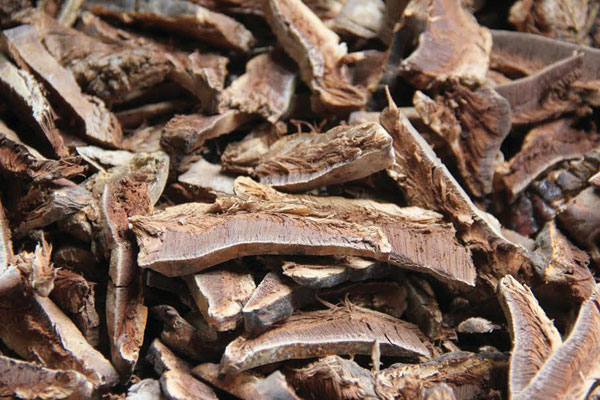(No.1, Vol.7,Feb-Mar 2017 Vietnam Heritage Magazine)

Slices of the fungus. Photo: James Gordon
A cure-all out of Mother Nature’s medicine chest
Nam Linh Chi is a mushroom which has been venerated and celebrated in Far Eastern countries for more than two thousand years, and, as such, is one of the oldest mushrooms to be used medicinally. The name translates as ‘supernatural mushroom’. Those of you were attracted to this article seeking a hallucinogenic high, read no further. Those of you who wish to maintain good health or who wish to alleviate or cure ailments in a natural way, please read on. I myself am sixty-one years old with no medical issues and indeed the last time I fell ill was with the flu fifteen years ago. For this, I thank God and I believe my diet which includes a heavy use of fish, fruit and vegetables, extra virgin oil and drinking herbal teas and medicinal wines containing ginger, artichoke, ginseng and latterly linh chi. Linh chi, especially in Japan, can even be added to coffee but I have never tried that.
This fungus has red, orange and black and even purple varieties. The Vietnamese name derives from the Chinese ‘linh zhi’ and in Japan it is known as reishi. The Latin name ‘ganoderma lucidum’ translate as bright shining skin which tells of its appearance. Aside from East Asia, it is also to found in the forests of Northern America. It grows out of the wood of living trees and also felled ones on logs and stumps. The maple tree is a favourite host. In the wild, only three in ten thousand trees will have the fungus. Therefore, commercially, linh chi is ‘farmed’. This means it is grown indoors under sterile conditions or outdoors on logs or wood chip beds. Its amazingly wide powers to cure and keep the body spry derive from its special enzymes that break down the lignin and cellulose in the wood it grows upon.
My knowledge and use of this mushroom I owe to my wife, who is an enthusiastic herbalist. Her home town is Hue and near the city there is a high mountain plateau hard by the Laos border. The little town of A Luoi is where we source our household linh chi. Family members send it to us via the long distance coach companies, which is a lot cheaper than the post office. We currently pay VND1,200,000 per kilo, whereas in the Saigon markets, it goes for between two to four million dongs a kilogramme.
We are all used to certain foods and medicaments being touted as the great panacea. Most of the time they go in and out of fashion quite quickly. This one, however, is the most scientifically researched herb ever and has two millennia of continuous human use to lend its effects further credence. It is useful in combating viral infections such as influenza. It can help to cure complaints of the lung such as bronchitis and asthma. It is also prescribed for heart diseases and conditions such as high blood pressure and high cholesterol. The list goes on — kidney and liver diseases, altitude sickness, chronic fatigue syndrome (C.F.S), insomnia, stomach ulcers, poisoning, herpes pain and stress and fatigue reduction. Whilst not in the first line, research has shown it can be an adjunct in cancer treatment and even HIV. But its most celebrated use is in helping us not to get sick in the first place by strengthening and balancing the immune system. There are no known side effects. As with all herbal medicine one should not expect instant results.
As this mushroom has a woody and extremely bitter taste, it cannot be eaten either raw or cooked. Thinly sliced or pulverised linh chi needs to be put in a pot of water and simmered for two hours and the water consumed. For greater concentration, the process can be repeated. It can also be made into an extract in powder, capsule or liquid form. Of course, another very pleasant way to consume it is steeped in rice wine over a period of time. This is available commercially often in very attractive bottles. Many Vietnamese, including my wife, make it at home. Of course, it should be consumed in moderation, but should you overdose, I can tell you from personal experience there will be no hangover.
Whether you are in full health or you suffer from any ailment, I hope this introduction to an elixir which East Asians prize even above ginseng has been useful to you. Watch out for this one on your travels in Vietnam. If you do get the chance to raise a glass or two of Linh Chi wine among friends, you will be able to say with more sincerity than with most other alcoholic beverages ‘To your health’.
Acknowledgements: Truong Thi Mai has been my principal informant in writing this article.
,,
,,

